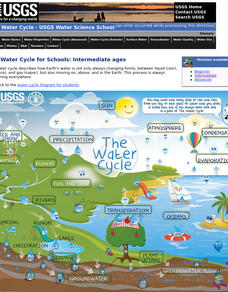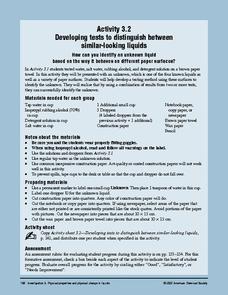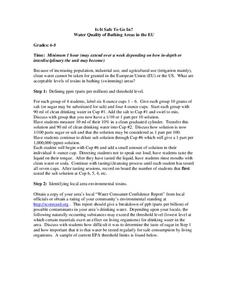Curated OER
Earth's Water: A drop in your cup
Students complete activities where they observe the amount of freshwater in the world as a fraction of the actual amount of water using different mixtures. In this freshwater lesson plan, students brainstorm on how to preserve freshwater.
Smithsonian Institution
Water/Ways: The Poetry of Science
Water is the source of life. It appears in poetry in both peaceful and torrential descriptions; it appears in earth science in its liquid, gaseous, and solid states. Combine these interpretations of our planet's most precious and...
NOAA
The Cycle of Water
Help young scientists get to the bottom of the water cycle with this comprehensive earth science lesson. After first viewing and discussing presentations about the states of water and the water cycle, the class performs a series of...
American Chemical Society
Why Does Water Dissolve Salt?
Individuals explore solubility by modeling how water dissolves salts. They then view a video and compare how well water and alcohol dissolve salts, relating their comparisons to the structure of each molecule.
American Chemical Society
Can Gases Dissolve in Water?
Why does soda fizz when opened? Learners discuss the appearance of bubbles in soda bottles when opened. In groups, they design and complete an experiment comparing the amount of carbon dioxide dissolving in cold versus hot liquids.
K-State Research and Extensions
Water
How are maps like fish? They both have scales. The chapter includes six different activities at three different levels. Scholars complete activities using natural resources, learn how to read a map, see how to make a compass rosette,...
Baylor College
What Is the Water Cycle?
Small groups place sand and ice in a covered box, place the box in the sunlight, then observe as evaporation, condensation, and precipitation occur. These models serve as miniature water cycles and demonstrations of the three phases of...
Curated OER
Sometimes, solid + liquid = gas
Third graders experiment with common household liquids and solids. In this chemical reaction lesson, 3rd graders discuss phase changes and experiment to find other ways to create gases. They use water, vinegar, lemon juice, flour, baking...
Santa Monica College
The Density of Liquids and Solids
There are underwater rivers that flow on the ocean floor thanks to a difference in density. Scholars learn about the density in both liquids and solids in the second lesson of an 11-part series. They then determine the density of water,...
Concord Consortium
Mixing Liquids
Sometimes being mixed up is a good thing! Young chemists explore the basics of making solutions with a realistic interactive. Pupils observe the differences in volume using quantities of water and ethanol, as well as the effects of...
Curated OER
I Just Drank George Washington's Water!
Guide your learners through the water cycle with this lesson plan. Over the course of the instructional activity, they read two Magic School Bus books, discuss the water cycle, come up with water facts, complete a diagram of the water...
American Museum of Natural History
What's the Big Deal About Water?
It may seem simple, but water is one of the most unique substances on Earth. An interactive online lesson describes its properties and importance in so many different situations. Learners interact with the lesson to learn the role water...
American Chemical Society
From Gas to Liquid to Solid
From gas to liquid condensation to solid frost, water undergoes phase changes before students' eyes! Using ice, salt, water, and a metal can, they set up an investigation that can be used in a physical science setting, or as part of a...
Virginia Department of Education
Physical and Chemical Properties of Water
How can you effectively provide detailed concepts of water properties to your high school class in a way they find exciting and challenging at the same time? By letting them play, of course! Through a variety of experiments, pupils...
Foundation for Water & Energy Education
What is the Water Cycle? Activity A
Hydrologists create a concept map about how water is used and a sentence strip defining water and describing its unique properties. Small groups work together to fill a small milk carton and compute the mass of water inside. The next...
US Geological Survey
The Water Cycle for Schools: Intermediate Ages
Water can travel from the highest mountain tops to the largest oceans. Using an interactive, young scientists trace the movement using an interactive online resource. They follow the water cycle by reading pop-up explanations on a...
Curated OER
Water Quality and Environmental Pollution
Learners use litmus paper to begin to discover the qualities of acids and bases. They learn about pH by testing clear liquids for acidity with purple cabbage juice as an indicator. The video Streamkeeper, with Bill Nye, and other video...
American Chemical Society
Developing Tests to Distinguish Between Similar-Looking Liquids
Each group talks about how to test unknown liquids based on their findings in the previous experiment. In this second of four activities, they test unknowns on wax paper, newspaper, and construction paper. As a stand-alone, this lesson...
Curated OER
A Device That Condenses Water
Fifth graders who are studying water vapor and the condensation process use this worksheet to help them understand the process of condensation. Most of the worksheet is simply a source of information, with a good descriptive paragraph...
Alabama Learning Exchange
The Water Cycle
Learners identify the stages of the water cycle. They listen to the book "Magic School Bus: Wet All Over," examine the Build Your Own Water Cycle website, predict and measure the amount of water in a jar for a week, and read a short play...
Curated OER
Is It Safe to Go In? Water Quality of Bathing Areas in the EU
Using your senses, apprehend the effects of contaminants in water. With a global focus, young scientists conduct a safe experiment by tasting sugar and salt water with different dilutions. After reviewing threshold limits, learners write...
Curated OER
Liquid Rainbow
Students develop their own techniques for drawing a small sample of solutions into a straw. They hypothesize ways to increase the density of water, and discuss how salt-free rainwater tends to float on top of salty seawater.
Curated OER
Water Alchemy
After reading "Aquatic Alchemy," an article about recapturing water for reuse when in space, your class will use calcium hydroxide or hydrated lime to purify cloudy water. Geared toward high school chemistry or environmental science...
Curated OER
Water Pressure Blaster
Third graders complete an experiment to introduce them to the concept of water pressure. In this water pressure lesson plan, 3rd graders create pressure in a water bottle and observe the force of water that is created.

























